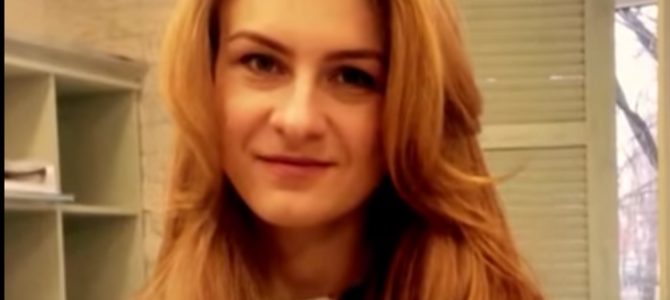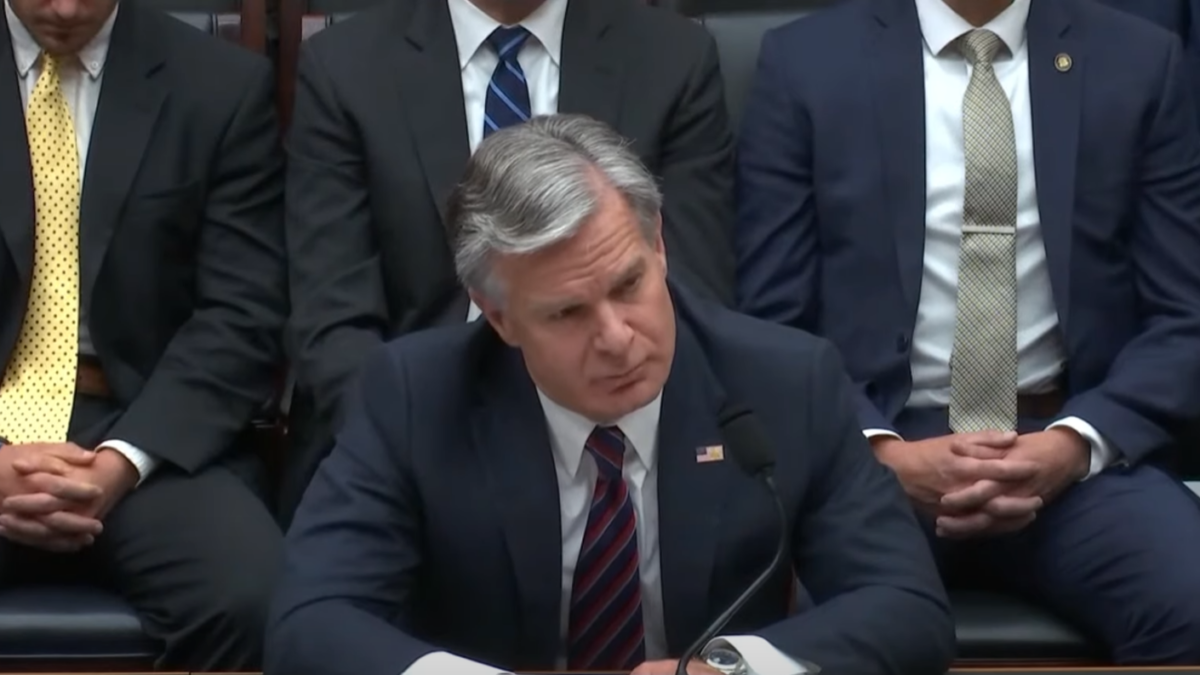
Maria Butina wanted to see Mount Rushmore. A Russian gun-rights advocate, she had come to the United States in the spring of 2014 to attend the annual conference of the National Rifle Association in Indianapolis, where she rang the NRA’s replica of the Liberty Bell to open a day’s sessions. She decided to use the rest of her American visit to see the touristy sights: the Grand Canyon, Niagara Falls, and the like, including, naturally, the faces carved on Mount Rushmore.
Maria was escorted on her travels by the Republican activist and South Dakota businessman Paul Erickson. Since he was planning to visit my family on that trip to the Black Hills, he brought her along for a dinner of buffalo steaks at my parents’ house.
The company was good, the conversation lively. I quoted to her Robert Heinlein’s line that an armed society is a polite society, and she laughed. Americans are so friendly, she told me, but not deep. In Russia, when someone asks how you are, they expect long, detailed, and philosophical answers, not the American reply of “Good. How are you?”
Maria and I seemed to hit it off that night, enough anyway that after several drinks, she leaned over to hug me and tell me I had the soul of a Russian. She came back to America over the coming years, meeting far more famous and influential people, attending graduate school at American University, and, as of July 16, being indicted by the Justice Department for the federal crime of failing to register as a lobbyist for a foreign power.
If the indictment and FBI affidavit are any guide, the now 29-year-old has been working the whole time for the man she called her “funder,” the Russian billionaire Aleksandr Torshin, an ostensibly retired oligarch reported to have close ties to the Kremlin. Of course, if the information released thus far about her indictment is any guide, she also doesn’t seem to have committed much of a crime.
Over the past few weeks, from the New York Times to Mother Jones, the Washington Post to GQ, Fox News to NBC, the media has been overflowing with reports about her. Nearly every report has a kind of breathless quality, a suggestion that a straight line connects Butina’s efforts to meet powerful people with Trump’s assumed collusion with Russia to steal the 2016 election.
Add a salacious element of sexual shenanigans, the connection with the NRA, and her indictment’s proximity to the recently announced indictment of 12 Russian intelligence officials, and the story almost writes itself. She is a spy, you see. She is the missing link that ties together everything bad, from guns to Trump, all in a neat Russian bow.
For a spy, however, she doesn’t seem to have been any good. Butina obtained no secret information, failed to bring about any actual meetings for senior Russians, and communicated with her alleged handlers via Twitter messages and unsecured email. It’s hard to believe that anybody is this bad a spy. The public evidence so far of her supposed spying suggests she wasn’t actually spying.
She wanted to meet influential people, apparently at the behest of her Russian backer, which is not a crime. She also apparently wanted to influence those influential people, which could be a crime for an unregistered foreign agent. But what we don’t have is evidence that she actually succeeded in influencing anyone.
Not necessarily for lack of trying. She is alleged to have sent Torshin a picture of herself on the street at Trump’s inauguration, along with thousands of other people, which prompted Torshin to reply, “You’re a daredevil girl! What can I say!”
She posed with automatics and skimpy clothing for the Russian version of GQ magazine, and Torshin told her she had “upstaged” the sultry Russian spy Anna Chapman, arrested in New York in 2010. Chapman “poses with toy pistols, while you are being published with real ones,” he noted with satisfaction.
Butina also made the news in January 2018, when The New York Times breathlessly circulated the short-lived rumor that she had been the conduit through which the Russian government could have funneled millions of dollars to the NRA to help finance a pro-Trump advertising push during the election. The rumor died when further investigation found no public evidence that Russians funneled millions of dollars through the NRA to Trump.
Perhaps more to the point, the publicity might have pleased Torshin, but it would have made any actual spying far more difficult. Still, that brief-lived story suggested the reason for the torrent of news stories that have followed Maria’s indictment: It all feels as though, somehow, it ties together the NRA, Russia, and the Republicans’ unlikely 2016 victory.
In truth, all the evidence revealed so far points indicates Butina probably wasn’t a spy or even much of a successful agent of a foreign power. Strip from her story all the other narratives floating around these days in American politics, and she seems mostly to be a recognizable type.
Maria looks basically like a young woman on the make. She wanted to meet powerful people and be thought of as someone important. She convinced Torshin to finance her while she did it. She got to speak at Republican events, from a summer camp in South Dakota to panel discussions on gun rights in Washington DC. She got invited to events. She could persuade herself that she was helping paint Russia in a good light, while she got her graduate degree paid for.
It was all exciting and fun, thrilling for a young woman. Possibly it crossed some lines into the crime of being an unregistered agent, but spying isn’t the name for it.
Of course, even if she was primarily a young woman looking to advance herself, that doesn’t preclude her reporting back to her funder in Russia and him passing her reports to Russian authorities. It doesn’t seem intelligent for spies to use Twitter messages for secret communiqués, but it is difficult to prove a negative and demonstrate that she was not a spy. Still, the narrative being built around her doesn’t seem to fit the young woman I met.
In a way, she was better off pursuing that ambition in the United States than in Russia, even if it did end up getting her indicted. Her conversation at dinner back in 2014 was certainly not opposed to Vladimir Putin, but it wasn’t much in praise of the man either. Running a pro-gun organization in an autocracy is dangerous business. Guns, she told me, are the citizens’ last defense against tyranny. Left unsaid was that the tyrant in question was Putin.
Even while we drank together, I could sense that she was looking for a different path for her life.









